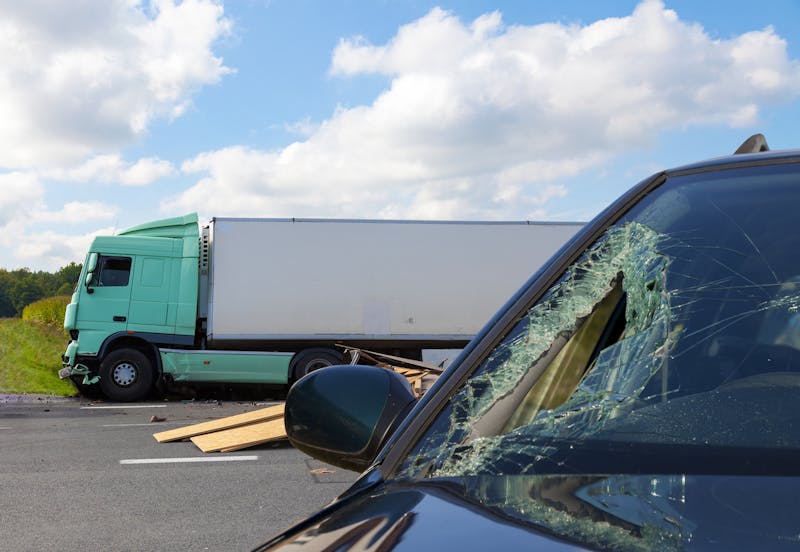Contact Us
Complete the form below for a free case evaluation.

Truck accidents can cause devastating damage, serious injuries, and long-lasting emotional trauma. Unlike ordinary car accidents, determining fault in a truck crash is rarely straightforward. Due to the large number of people and companies involved in the trucking industry, liability may be shared among multiple parties, and identifying who is responsible often requires a thorough investigation.
No matter who is at fault for your truck accident, working with an experienced truck accident attorney from Webster Vicknair Macleod can make all the difference in securing compensation.
The responsible party must be identified and held accountable before any insurance payout or lawsuit resolution can occur. Determining fault matters for a few key reasons:
Understanding who is responsible starts with knowing how truck accident investigations work.
Fault is typically determined through an extensive investigation into all of the facts and evidence involved in the accident. Truck accident investigations usually begin at the scene but continue long after the crash. Investigators will gather a range of evidence, such as:
All this information is used to piece together how the accident occurred and whether safety violations, fatigue, speeding, distracted driving, or equipment failure contributed to the truck accident. Our truck accident attorneys frequently collaborate with accident reconstruction experts, mechanical engineers, and trucking industry consultants to identify contributing factors and determine responsible parties.
Acting quickly after a crash is essential. Some records may be lost, destroyed, or legally purged unless preserved through a spoliation letter or a legal request.
Some truck accidents are caused by driver error, while others stem from mechanical failures, improper loading, or negligence at the company level. Some common causes include:
Each factor plays a role in determining who is ultimately at fault.
Multiple parties can potentially be held liable in a truck accident. Truck accident claims differ from car crash cases in one significant way: more parties are often involved. That means more opportunities for recovery, but also more complexity.
Here are the key parties who may be found liable:
Drivers are often the first to be scrutinized in an accident. They may be personally responsible if the driver was speeding, distracted, intoxicated, or fatigued. However, even if the driver made a mistake, that doesn’t mean they’re the only one to blame.
Trucking companies are responsible for hiring, training, and supervising drivers. They must also comply with strict federal safety regulations. A company might be liable if it:
Trucking companies can also be held vicariously liable for the actions of their employees under a legal doctrine called respondeat superior.
Sometimes, a truck is owned by one company but leased or operated by another. In these cases, liability may extend to the vehicle owner if they failed to maintain the truck or allowed it to be used in unsafe conditions.
If a third-party company was responsible for loading the trailer and the load shifted or caused the truck to become unstable, they could be held liable. Improper cargo securement is a leading cause of jackknife and rollover accidents.
If a separate company were responsible for maintaining the truck, it could be held liable for failures resulting from poor repairs or overlooked safety issues.
Mechanical failures are sometimes due to product defects, not improper maintenance. A manufacturer or parts distributor could be liable under product liability laws if a defective component caused or contributed to the crash.
If a poorly maintained road, missing signage, or a faulty traffic light contributed to the crash, a government agency could be held partly responsible. Suing the government involves strict procedures and shorter timeframes, so these cases require immediate legal action.
Truck accident cases are high-stakes, highly technical, and often involve multiple defendants and aggressive insurance companies. These cases are not like typical car accident claims.
Our seasoned truck accident lawyers will:
Trying to navigate this process alone or with an attorney lacking trucking case experience can cost you thousands in lost compensation.
Even if the truck driver caused the crash, deeper layers of responsibility may involve their employer, vehicle owner, maintenance team, or others. Establishing fault in a truck accident is an intricate process that requires legal knowledge, resources, and timely action. If you or a loved one has been hurt in a collision with a commercial truck, speak with a knowledgeable personal injury attorney who understands how to investigate and hold all responsible parties accountable.
At Webster Vicknair Macleod, we help victims of truck accidents uncover the truth, prove fault, and recover the compensation they deserve. Let us handle the investigation and negotiations while you focus on healing. Contact us online to schedule your free consultation.
Federal Motor Carrier Safety Administration. (n.d.-a). Electronic logging devices. U.S. Department of Transportation. https://www.fmcsa.dot.gov/hours-service/elds/electronic-logging-devices
Federal Motor Carrier Safety Administration. (n.d.-b). Hours of service. U.S. Department of Transportation. https://www.fmcsa.dot.gov/regulations/hours-of-service
National Highway Traffic Safety Administration. (n.d.). Event data recorder. U.S. Department of Transportation. https://www.nhtsa.gov/research-data/event-data-recorder
Complete the form below for a free case evaluation.
© Webster Vicknair Macleod. All Rights Reserved.